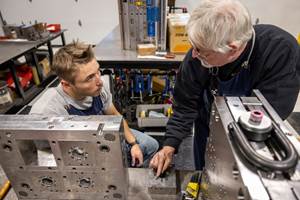National Institute for Metalworking Skills Partners with Winners of Job Training Grant
Community colleges will use national standards, credentials to prepare more students and workers for success in high-demand careers.
The National Institute for Metalworking Skills (NIMS) will partner with 30 community colleges, which were part of five winning applications selected in the fourth round of grants under the Trade Adjustment Assistance Community College and Career Training (TAACCCT) competitive grant program. The partnerships will build quality programs that give individuals the training, skills, and industry credentials they need to get and keep jobs in precision machining.
NIMS will work with lead colleges Central Arizona College in Colligde, AZ, South Central College in North Mankato, MN, Richland College in Dallas, TX, Lorain County Community College in Elyria, OH, and Texas State Technical College in Abilene, TX, to deliver quality, industry-aligned training connected to labor market opportunities. The partnership’s goal is to increase the number of students with industry-recognized credentials and improve participant employment and earnings outcomes. Additional colleges that will collaborate with NIMS to support individuals in earning NIMS credentials include:
- Ridgewater College
- Saint Paul College
- Minneapolis Community & Technical College
- Lake Superior College
- Dakota County Technical College
- Century College
- MN West Community and Technical College
- Northland Community and Technical College
- Riverland Community College
- MN State Community and Technical College
- Bemidji State University
- Normandale Community College
- Gateway Community College
- Eastern Arizona College
- Estrella Mountain Community College
- Cincinnati State Technical and Community College
- Columbus State Community College
- Lakeland Community College
- Owens Community College
- James A. Rhodes State College
- Sinclair Community College
- Stark State College
- Zane State College
- Eastern Gateway Community College
- Cuyahoga Community College
“There are an estimated 99,500 projected job openings for machinists and 117,100 projected job openings for industrial maintenance technicians nationally through 2020,” said Jim Wall, Executive Director, NIMS. “We are excited to be partnering with these with these institutions to help prepare more people for these growing careers by ensuring the highest quality training that is directly aligned to the industry’s skills requirements.”
NIMS has developed the skills standards in 24 operational areas ranging from entry-level to master-level that cover the breadth of metalworking operations, including metalforming and machining. All NIMS standards are industry-written and industry-validated, and are subject to regular, periodic reviews under the procedures accredited and audited by the American National Standards Institute (ANSI). NIMS certifies individuals’ skills against these national standards via 52 distinct certifications that companies can use to recruit, hire, place, and promote individual workers. Training programs incorporate the credentials as performance or completion measures of academic coursework in metalforming or machining programs. The credentials are often the basis for articulation among training programs. In 2013, NIMS issued 13,888 industry-recognized credentials, representing a 59% increase from 2012.
NIMS has also launched a new Competency-Based Apprenticeship System for the nation's metalworking industry. Developed in partnership with the United States Department of Labor, and over 300 companies, the new apprenticeship system integrates NIMS national standards and skill certifications into measuring required competencies.
For more information about NIMS standards and credentials, visit https://www.nims-skills.org.
To learn more about how to partner with NIMS, please contact Jim Wall at staff@nims-skills.org.
About the National Institute for Metalworking Skills
The National Institute for Metalworking Skills (NIMS) was formed in 1995 by the metalworking trade associations to develop and maintain a globally competitive American workforce. NIMS sets skills standards for the industry, certifies individual skills against the standards, and accredits training programs that meet NIMS quality requirements. Visit nims-skills.org.
Related Content
MMT Chats: The Science of Moldmaking, Part 2
In Part 2 of this two-part MMT Chat, Christina and Don continue their conversation by exploring lean manufacturing and tips on how to attract, train and retain the future workforce.
Read MoreHow to Foster Innovation Through a Culture of Education, Mentoring
Dynamic Tool Corp. shares its strategy for building a team with the right attitude and aptitude to deliver innovation that meets customer expectations.
Read MoreConfronting the Mold Design Talent Drought
Recently, I reposted on LinkedIn the results of an informal survey we conducted, which revealed a shortage of skilled mold designers. It quickly gained a lot of traction. Given the response, I thought I'd summarize the feedback and keep the conversation going.
Read MoreEden Tool and Eden Manufacturing: A Story of Resilience, Growth and Innovation
This critical parts manufacturer, founded on solid tooling fundamentals, didn’t get derailed with the unexpected passing of the owner because leadership was already building a solid business, not just a good tool shop. Here’s how they managed change incrementally… and they’re not finished yet.
Read MoreRead Next
Are You a Moldmaker Considering 3D Printing? Consider the 3D Printing Workshop at NPE2024
Presentations will cover 3D printing for mold tooling, material innovation, product development, bridge production and full-scale, high-volume additive manufacturing.
Read MoreHow to Use Continuing Education to Remain Competitive in Moldmaking
Continued training helps moldmakers make tooling decisions and properly use the latest cutting tool to efficiently machine high-quality molds.
Read MoreHow to Use Strategic Planning Tools, Data to Manage the Human Side of Business
Q&A with Marion Wells, MMT EAB member and founder of Human Asset Management.
Read More
























